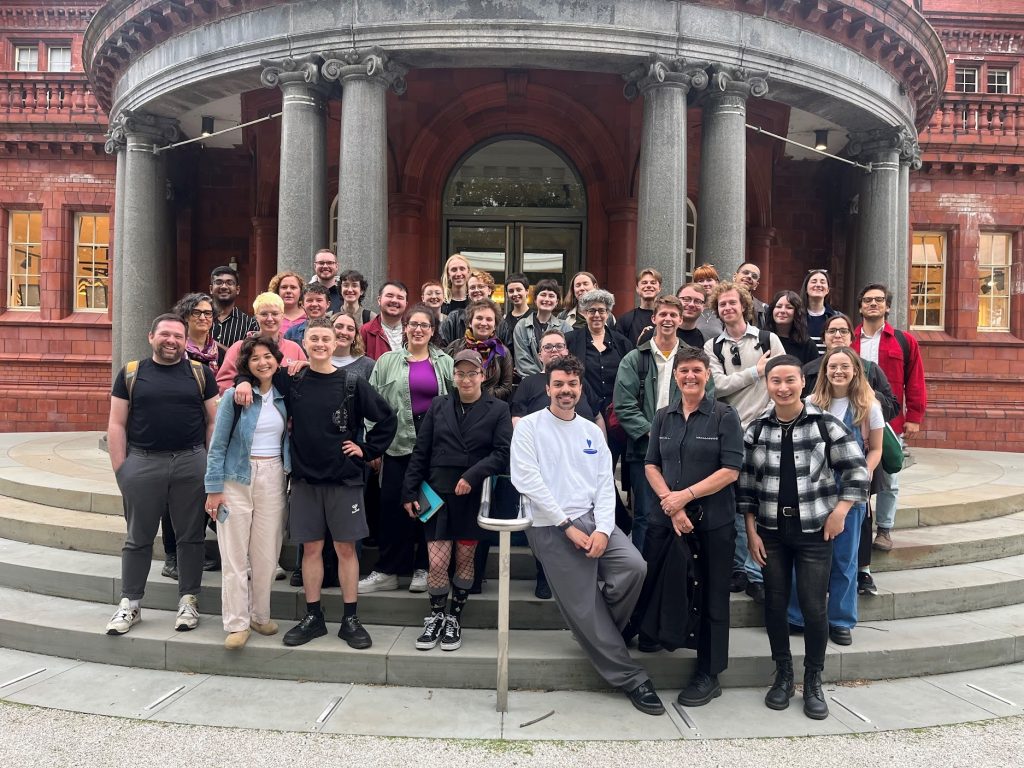
As we begin to plan for Sexuality Summer School (SSS) 2024, we take a look back at SSS 2023
Funding Report, Sexuality Summer School 2023: (Up) Against Nature, Sunday 21st – Friday 26th May 2023
This year’s Sexuality Summer School (SSS) once again saw 40 postgraduates attend the University of Manchester for a six-day programme of workshops, seminars, lectures, film screenings, and performances on key feminist and queer debates in the study of sexuality. Responding to the growing hostilities towards gender and sexual minorities in the midst of climate catastrophe, this year’s Sexuality Summer School considered what it means to be ‘(up) against nature’, exploring the overlaps and tensions between sexuality and ideas of the natural or the unnatural. Through large and small group discussions, we engaged with film, photography, and live performances alongside conceptual and political debates informed by ecocritical, feminist and queer ecological studies.
The SSS attracted postgraduate students from the University of Manchester, as well as students from across the length and breadth of the UK: from institutions in Bath, Birmingham, Cambridge, Durham, London, Ormskirk, Oxford, and Warwick, as well as from further afield, in Australia, Catalonia, Finland, and the Netherlands.
These delegates represented a diverse range of disciplines and multidisciplinary research projects, including Art History, Creative Writing, Education, English and Comparative Literature, Film and Television Studies, Graphic Design, Linguistics, Media and Cultural Studies, Medieval and Modern Languages, Music, Political Science, and Sociology.
Funding from the NWCDTP enabled us to put on several events at cultural venues across Manchester. We held a screening of the Spanish film Sedimentos (dir. Adrián Silvestre, 2021) followed by a panel discussion at HOME Cinema. The event sold 123 tickets, including SSS delegates and staff, as well as academics and students from beyond the SSS and members of the public in attendance. Bringing Sedimentos to new audiences in Manchester enabled a lively discussion of the film’s treatment of the “nature” of sex/gender in relation to (un)natural environments. Moreover, holding the event at a crucial arts venue such as HOME allowed us to model for our delegates and other audience members how film screenings can support public engagement and cultural partnerships.
We also held two events at Contact Theatre. The first event featured screenings by Whiskey Chow, a performance artist and Chinese drag king, and Ro Robertson, who explores the terrain of the Queer body, straddling sculpture, drawing and performance for camera. Both artists responded to their own works with a spoken piece, and the event ended with a Q&A chaired by Prof Jackie Stacey. This event was sold out, with 60 attendees. The second was a new solo performance by artist and choreographer, Nando Messias, entitled TransMission: Sissy TV. This event was also sold out, with 79 attendees. This work touched on questions of identity, inheritance, queer archives, costume and collectivity. Summer School delegates were given the opportunity to engage directly with the artists in workshops the following day. One delegate said: ‘Nando Messias’ performance and workshop introduced me to new pedagogical approaches, namely feral pedagogy and Anthropophagie. I will take these approaches forward in my teaching and student support role’. Another said that engaging with Ro’s work had been one of their ‘favourite moments of the SSS. As a young trans butch lesbian it was so special to be able to discuss butch embodiment and Stone Butch Blues with you [Ro]’. These events generated a fruitful exchange of ideas between academic, artistic and activist practices, and sparking new connections that both delegates and artists will carry forward.
Finally, NWCDTP funding supported us to host Zakiyyah Iman Jackson, Assistant Professor of English at the University of Southern California. Zakiyyah’s public lecture at the Anthony Burgess Foundation was attended by 70 people, including summer school delegates and members of the public. Zakiyyah’s lecture explored gender, racialisation and animality, offering a close reading of the uses of black pigment in late 20th-century painting by Black artists. Many of our delegates found that Zakkiyah’s lecture allowed them to mobilise anti-racist theories in their own research, informing approaches to their disciplines that reframed ideas through an understanding of non-white, non-Western approaches. One said: ‘Today’s lecture with Zakiyyah made me think in a new way about how queerness is fundamentally shaped through processes of racialisation […] I think this is completely going to fundamentally shape the way I think about my own project’. The Sexuality Summer School creates these opportunities for students to closely engage with high-profile artists and academics, to connect with fellow researchers, and to grapple with key debates in the study of sexuality.
SSS organising team:
Prof Jackie Stacey, Dr Janelle Hixon, Dr Sabine Sharp, Dr Eleanor Green, Tasha Pick (PhD student), and Millie Lovelock (PhD student), with additional support from Clare Patterson (PhD student)

0 Comments